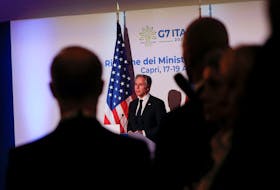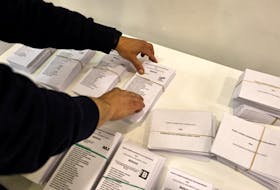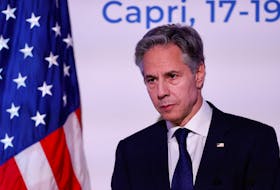HAPPY VALLEY-GOOSE BAY, N.L. — At the Muskrat Falls Inquiry, lawyers for politicians with the former Progressive Conservative government spoke about the need for politicians to be able to rely on advice from senior civil servants. A lawyer for senior civil servants then talked about the need for politicians to take advice when it’s given.
In final submissions Tuesday at the Lawrence O’Brien Arts Centre in Happy Valley-Goose Bay, there were clear points of contention, where Commissioner Richard LeBlanc will have to determine if individual decisions were reasonable.
Both lawyer Erin Best, representing former premier Kathy Dunderdale, and Tom Williams, for the Former Provincial Government Officials 2003-2015 (the group includes former premiers Danny Williams, Tom Marshall and Paul Davis, as well as former ministers Derrick Dalley, Jerome Kennedy and Shawn Skinner) highlighted the studies and reports completed before the Muskrat Falls project’s sanctioning.
Best said Dunderdale had a focus on two questions heading to the project’s green light in 2012: whether or not power was needed, and what the least-cost option would be for supplying that power. She emphasized the premier looked to Nalcor Energy, ministers and the civil service for answers.
“At the time of sanction and financial close, premier Dunderdale and her cabinet had a bona fide and reasonably held belief that Nalcor and the Muskrat Falls project had been subject to detailed review and oversight by an abundance of independent experts and by core government departments,” Best said.
Politicians are lay people, she said, and their decisions are made on the basis of what is provided to them.
“At the time of sanction and financial close, premier Dunderdale and her cabinet had a bona fide and reasonably held belief that Nalcor and the Muskrat Falls project had been subject to detailed review and oversight by an abundance of independent experts and by core government departments." — Erin Best
She said Dunderdale trusted her advisers and had no knowledge, for example, that a review of strategic risk was excluded from the review work of consultant Manitoba Hydro International (MHI).
Lawyer Andrew Fitzgerald, representing former clerk of the executive council Julia Mullaley and former deputy minister of Natural Resources Charles Bown, highlighted a recommendation made in writing by his client in May 2011 for a full financial review, including a review of project risk, independent of Nalcor Energy. The recommendation was written by Paul Myrden in the Department of Finance and approved by both Bown and former civil servant (later auditor general) Terry Paddon, and then brought by Bown and Paddon to the ministers of Natural Resources and Finance.
“It was accepted by minister (Shawn) Skinner and minister (Tom) Marshall, but ultimately not followed,” Fitzgerald said.
As Marshall previously said during his testimony, the idea was set aside when it was decided the project would go to the Public Utilities Board (PUB), regardless of the fact the PUB’s review was limited by the government in time and scope.
“My clients were a voice of caution,” Fitzgerald said. “They were providing policy advice and recommendations based on the information they had. They had a concern, they brought it forward to their minister and it was then up to the government to decide to act on it or not.”
“My clients were a voice of caution." — Andrew Fitzgerald
Meanwhile, Commissioner Richard LeBlanc also heard closing remarks by, and posed questions to, lawyers Bern Coffey, representing former clerk Robert Thompson, and both John Hogan and Chris Peddigrew, representing the consumer advocate.
Both Hogan and Peddigrew submitted the PUB should have been able to complete a full review of the project before it was sanctioned. They also issued heavy criticism of the actions of Nalcor, politicians and civil servants in relation to the Muskrat Falls project and offered a collection of related recommendations.
“First of all, number one, we note there was never a fulsome, thorough, independent analysis of the Muskrat Falls project costs, or to what extent the province could afford any overruns,” Hogan said.
He said the consumer advocate is calling for a legislative budget office to monitor spending, similar to the federal parliamentary budget office; a prohibition against provincial Crown corporations promoting their own projects; a requirement for Crown corporations to appear before the legislature before major expenditures (with threshold to be determined) to first answer questions in that setting; a new panel, to prepare the province for 2041 and the end of the existing contract governing Churchill Falls power; and more.
LeBlanc requested the comments be added to the consumer advocate’s written submission, for the record.
By the end of Tuesday’s hearing, the commissioner had heard from all parties with full standing at the inquiry.
Submissions continue Wednesday with parties granted partial standing. LeBlanc said he expects the final hearings to wrap up by the end of day Thursday.
(NOTE: This is an updated version, correcting an error in the attribution of a highlighted quotation.)
RELATED









